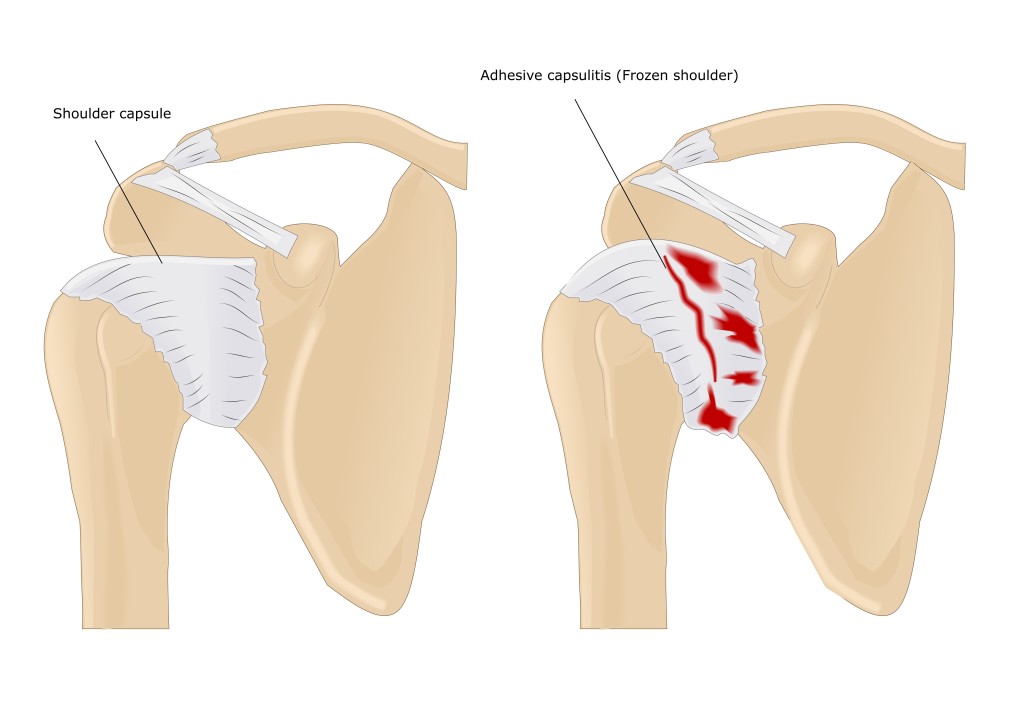What is Frozen Shoulder?
Frozen shoulder is a condition that develops over time and often starts with pain in the shoulder joint during basic movement; it is also diagnosed as adhesive capsulitis. Many people do not realize they have this condition because a stiff shoulder that feels tight and immobile can be mistaken as the result of bad posture, working out too hard or sleeping in an awkward position. If you see that the pain and stiffness lingers, it’s very possible that you have a frozen shoulder and if you do not seek the proper treatment, your pain will increase and your mobility will decrease, making the condition far worse.
What Causes a Frozen Shoulder?

Frozen shoulder is most common in adults between the ages of forty and sixty and more women develop this condition than men, although it can happen to anyone. It occurs whenever the tissues around the shoulder joint thicken and tighten and if left untreated, scar tissue will develop over time, limiting the space around the shoulder joint, resulting in restricted mobility. Once your shoulder joint becomes less mobile, it will affect the movements of your entire upper body.
While the exact root cause of frozen shoulder has yet to be discovered, it is believed that it occurs whenever the lining of the shoulder joint becomes inflamed, which causes scar tissue to form around it, leaving less room for movement. Stiffness will occur once inflammation and scar tissue increases.
Are You at Risk of a Frozen Shoulder?
Those with diabetes, hormonal imbalances and weak immune systems have a greater chance of developing frozen shoulder as do people who are prone to joint inflammation. Hormonal changes are why more women develop this condition than men, particularly women who are menopausal. A prolonged period of upper body inactivity because of injury, illness or surgery can also lead to a frozen shoulder as can poor posture because rounded shoulders will cause the shortening of one of the ligaments of your shoulder.
Physiotherapy Benefits Frozen Shoulder.
Frozen shoulder must be treated; otherwise, the pain and stiffness will become unbearable and will last for a number of years. Medication and surgery can help with recovery; however, the most common and effective form of treatment for this condition is physiotherapy, which will help treat a frozen shoulder successfully. Patients will see a significant difference because physiotherapists focus on stretching the shoulder joint to improve mobility while also relieving any pressure on the joint. Depending on the patient’s age, severity of the condition and other contributing conditions, therapy can take anywhere from just a few weeks to almost a year. Physiotherapists will also recommend gentle exercises for you to do at home to help improve your range of motion.
Also our physiotherapy clinic in both Pickering and Milton, Ontario is equipped with Extracorporeal Shockwave Therapy (ESWT), which is clinical proven to be very effective in treating Frozen Shoulder. Based on past years experience our physiotherapy treatment with use of ESWT can shorten healing time of Frozen Shoulder.
The application of extracorporeal shockwave therapy (ESWT) in musculoskeletal disorders has been around for more than a decade and is primarily used in the treatment of sports related over-use tendinopathies such as proximal plantar fasciitis of the heel, lateral epicondylitis of the elbow, calcific or non-calcific tendonitis of the shoulder and patellar tendinopathy etc. The success rate ranged from 65% to 91%, and the complications were low and negligible.
Spindler A, Berman A, Lucero E, Braier M: Extracorporeal shock wave treatment for chronic calcific tendinitis of the shoulder. J Rheum. 1998, 25 (6): 1161-3.PubMed
Pro Fusion Rehab can help with this condition and many others. If you are seeking a physiotherapy clinic in city of Milton or Pickering, contact us today and we will take care of all of your rehabilitation needs!
